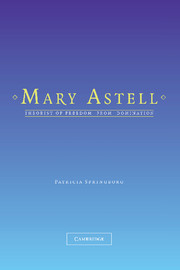Book contents
- Frontmatter
- Contents
- Acknowledgements
- Mary Astell, a Brief Chronology
- Introduction: Astell and Early Modern Feminism
- 1 Mary Astell, Philosopher, Theologian and Polemicist
- 2 Astell, Drake, Education, Epistemology and the Serious Proposal
- 3 Astell on Marriage, Patriarchalism and Contractarianism
- 4 Mary Astell and the Settlement of 1689
- 5 A Fair Way with the Dissenters and Their Patrons
- 6 Astell, Locke and the Highway Man: A Test Case
- 7 Astell, Drake and the Historical Legacy of Freedom
- Appendix: Glossary and Select Biographical Notes
- Notes
- Select Bibliography
- Index
Introduction: Astell and Early Modern Feminism
Published online by Cambridge University Press: 07 September 2009
- Frontmatter
- Contents
- Acknowledgements
- Mary Astell, a Brief Chronology
- Introduction: Astell and Early Modern Feminism
- 1 Mary Astell, Philosopher, Theologian and Polemicist
- 2 Astell, Drake, Education, Epistemology and the Serious Proposal
- 3 Astell on Marriage, Patriarchalism and Contractarianism
- 4 Mary Astell and the Settlement of 1689
- 5 A Fair Way with the Dissenters and Their Patrons
- 6 Astell, Locke and the Highway Man: A Test Case
- 7 Astell, Drake and the Historical Legacy of Freedom
- Appendix: Glossary and Select Biographical Notes
- Notes
- Select Bibliography
- Index
Summary
A Reply to My Critics: Astell, Locke and Feminism
Mary Astell (1666–1731) is now best known for her famous rhetorical question in the 1706 Preface to Reflections upon Marriage: ‘If all men are born free, how is it that all women are born slaves?’. These well-chosen words have earned her a place not only in the feminist but also in the republican canon as a theorist of ‘freedom from domination’. Prior to her recent resurrection she was best known as the author of A Serious Proposal, which advocated a Platonist academy for women, a project that seems briefly to have attracted the support of Queen Anne, to whom it was dedicated, until the ridicule to which it was subjected made it too politically risky. As the promoter of women's causes, and particularly women's education, Astell is said to have been the model for Richardson's Clarissa; and, as late as 1847, Lilia, heroine of Alfred Lord Tennyson's The Princess, dreams of a women's college cut off from male society. Astell's female academy was later famously lampooned in Gilbert and Sullivan's Princess Ida, but this time at one remove, through Tennyson. Over its gates the inscription would read, ‘Let no man enter on pain of death’, a deliberately truncated version of the famous inscription that adorned the doors of Plato's Academy, ‘Let No Man Enter Here Unless He Study Geometry’.
- Type
- Chapter
- Information
- Mary AstellTheorist of Freedom from Domination, pp. 1 - 26Publisher: Cambridge University PressPrint publication year: 2005



